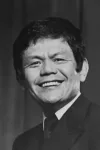The Water Margin (1973)
The Water Margin (1973)
Plot.
Where to Watch.
Media.


Details.
Release DateOctober 2, 1973
Original Name水滸伝
StatusEnded
Seasons2
Episodes26
Running Time50m
Content RatingNR
Genres
Wiki.
The Water Margin is a Japanese television series based on the 14th-century book Water Margin, one of the Four Great Classical Novels of Chinese literature. Made in two seasons of 13 episodes each by Nippon Television it was shown in Japan in 1973 and 1974 as 水滸伝 (Hepburn: Suikoden).The novel details the trials and tribulations of 108 outlaws during the Song Dynasty. This adaptation follows Lin Chung (Atsuo Nakamura) and his clashes with the local government official Kao Chiu (Kei Satō).
For an English-language version, it was adapted by David Weir without translations, using only brief plot synopses. The dubbed version, narrated by Burt Kwouk, was shown by the BBC from 1976 to 1978. An English novelisation, written by Weir, was released in 1978 as Water Margin.
You May Also Like.

The Simpsons (1989)

Family Guy (1999)

The Flash (2014)

Game of Thrones (2011)

Doctor Who (2005)

South Park (1997)

Suits (2011)

The Walking Dead (2010)

Breaking Bad (2008)

It's Always Sunny in Philadelphia (2005)

Fringe (2008)

24 (2001)

The Big Bang Theory (2007)

Star Wars: The Clone Wars (2008)

The Shield (2002)

Mr. Robot (2015)

Sherlock (2010)

The IT Crowd (2006)

Firefly (2002)

Wayward Pines (2015)





















